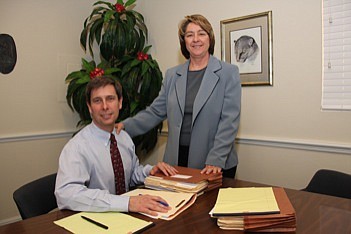The billable hour is the benchmark of the legal profession.
But Osterhout, McKinney & Prather, a Fort Myers law firm specializing in elder law, started charging a flat fee three years ago, promising life-planning services for the remaining short life of a chronically ill person.
The idea was to diversify the firm's sources of income and generate steadier revenues. The firm charges between $10,000 and $20,000 to help a chronically ill person with a predictable diagnostic outcome manage their financial and medical affairs.
“It started out really well and then the economy hit,” says Lance McKinney, one of the firm's partners. Prospective clients are more reluctant than they used to be to part with a large sum. “They're so afraid,” McKinney says. “They lost half their money in the market.”
Despite the downturn, McKinney and partner Beth Prather say the business is profitable and now accounts for about 20% of the firm's annual billings (the firm declines to share that dollar figure).
The idea is to offer clients a certainty that they wouldn't get if they were charged by the hour. McKinney, for example, charges $300 an hour.
But the law firm quotes a flat fee on about 65% of the clients who come seeking help managing their financial and medical affairs for themselves or a loved one who is chronically ill and nearing the end of their lives. That's because the flat fee covers the person for their remaining days.
The attorneys at Osterhout, McKinney have a difficult balancing act. They have to be careful that the cases they take on won't drag out so long that it would be unprofitable. “Some clients really get the benefit,” says McKinney, referring to clients who live longer than expected.
Insurance companies make these kinds of pricing decisions all the time, but it's unusual for a law firm to do this. Unlike insurance companies, Osterhout, McKinney doesn't hire actuaries to determine how to price their flat fee. Prather says this judgment comes from gut instinct instead of calculating life expectancies using actuarial tables. “We have 20 years of experience creating these plans,” she says.
McKinney concedes that some cases are labor intensive and demand a lot of the staff's time. The firm has a licensed clinical social worker and geriatric-care manager on staff. “It's not the most profitable part of our business,” he says.
The most profitable part of Osterhout, McKinney's business remains helping clients in a crisis situation. Besides the lawyers' hourly fee, the firm also charges $100 per hour for its staff time.
The downturn in the economy has slowed the flat-fee business because it requires people to make decisions before a crisis occurs and spend a relatively large sum of money up front. “They'll push off making a decision,” Prather says.
Once a client does agree to pay the fee, the firm has to manage expectations. For example, the firm will act as an advocate in medical settings but doesn't have the staff to visit them every day in the hospital, for example.
McKinney and Prather have taken care not to move beyond legal advice. For example, they'll help clients evaluate long-term-care insurance policies but they don't sell them.
“You can quickly get out of what you do well,” McKinney says.
—Jean Gruss






